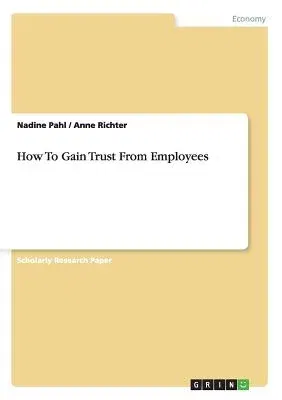Research Paper (undergraduate) from the year 2008 in the subject
Leadership and Human Resources - Miscellaneous, grade: 1,0, University
of Applied Sciences Berlin, course: Human Resource Management, language:
English, abstract: 'Trust permits risk, which permits change, which
permits growth.' You know when you have trust; you know when you don't
have trust. Trust is built and maintained by many small actions over
time. In the business environment, trust is also warned, over time,
through day-to-day actions making the right choices even in difficult
situations. There is a human need to trust and respect the leaders into
whose hands we deliver ourselves. Trust forms the foundation for
effective communication, employee retention, and employee motivation and
contribution of discretionary energy, the extra effort that people
voluntarily invest in work. When trust exists in a company or in a
relationship, almost everything else is easier and more comfortable to
achieve. A manager will not get top performance out of any employee who
does not trust him. Without the employees' trust managers will not get
that spark of creativity from them that is so important. Employees will
not innovate that one little idea that could have kept a company ahead
of its competitor. Yet, even in a company in which trust is a priority,
things happen daily that can injure trust. Trust is the crucial
ingredient of organisational effectiveness. Building it, maintaining it,
and restoring it when it is damaged must be at the top of every
manager's agenda. Trust is not a matter of technique, but of character;
managers are trusted because of their way of being, not because of their
polished exteriors or their expertly crafted communications. Gaining
employees trust is about telling the truth, even when it is difficult,
and being truthful, authentic. Of course, there are no fixed rules of
how to gain trust from your employees. But there are some easy but
important guidelines that help managers creatin


